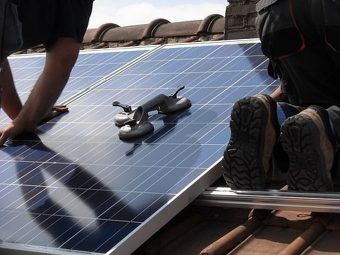
In one of President Donald Trump’s biggest trade agreements thus far in 2018, he’s imposed a 30-percent tariff on imported solar panels.
Currently, 60 percent of solar panels are manufactured in China and other parts of Asia, and they’re cheaper than their American counterparts.
The Solar Energy Industries Association is predicting 23,000 people will lose their jobs.
But in Montana, installers are singing a different tune.
“In a smaller market like Montana we’re not competing against those bigger behemoths that cause those costs to rise because their companies are so small,” said Brad Van Wert, CEO of Bozeman-based Solar Harvest.
“We have people concerned because they’re hearing 30 percent, ’30 percent, oh my gosh, I’m not even sure I can do it already, and now 30 percent,’ but I want everyone to understand that’s only on a portion of the products, and that’s not even on products that every installer uses,” he added.
One of those small-scale installers is Andrew Faber from Glacier Solar Energy. Faber works independently and caters to RV customers who want the freedom to travel into remote areas off the grid.
He says he already only uses American-made panels from a manufacturer in Oregon for a number of reasons.
“The quality of the panels is better, the customer service and the warranties,” he said. “There’s a huge nationwide dealer system if anything were to happen.”
Jeff Arcel, from Aeon Renewable Energy in Whitefish, has been doing solar projects in the Flathead County since the 1970s.
He installed the county’s only solar-powered gas station and has worked on large-scale residential and commercial projects.
“I don’t really think it’s going to affect me or the jobs I get up here,” he said, and noted that his most recent project would’ve cost a difference of $1,000 had he used imported solar panels.
Arcel says he’s not a fan of tariffs on anything, but he doesn’t believe they’ll stop the solar industry’s growth.
“The solar industry is a very robust, healthy and adaptable industry,” said Arcel.
“I’ve seen it grow and change a lot, particularly in the last 10 years here in the United States, and I think it can survive unfair policies,” he said.
Source: nbcmontana.com
